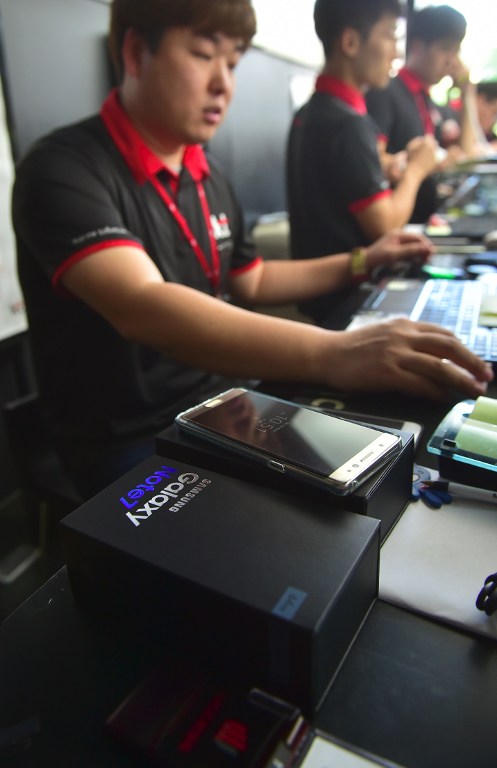
Samsung started on September 19 to provide users of its Galaxy Note 7 smartphone the first batch of replacements with new batteries, after a series of battery explosions prompted a major recall worldwide. / AFP PHOTO / JUNG YEON-JE
SEOUL, South Korea (AFP) – Samsung rolled out replacements for Galaxy Note 7s plagued by exploding batteries in South Korea on Monday, but only a handful of customers appeared to have taken the opportunity to swap their handsets.
The world’s largest maker of mobile phones recalled 2.5-million units of its top-of-the-range model more than two weeks ago, after batteries began catching fire while charging.
But users snubbed the South Korean electronics giant’s offer of a temporary replacement until new Note 7s became available, and there seemed to be little urgency among consumers for the permanent fix offered on Monday.
The success of the recall is seen as crucial to Samsung retaining brand loyalty and preventing customers defecting to arch-rival Apple’s new iPhone 7 or cheaper Chinese-made models.
A Samsung spokeswoman confirmed the firm had started to offer the replacement handsets in South Korea and several European nations including Britain on Monday — and would follow suit in the US on Wednesday and expand to other markets by next week.
The company began offering replacements for users in Canada and Singapore last week and is set to start soon in other nations including Mexico, Taiwan, New Zealand the United Arab Emirates.
But with only a trickle of customers visiting stores in Seoul on Monday for their replacements, the fate of the much-hyped handset remained unclear, although consumers in the South Korean capital were sympathetic.
“I felt terrible when I heard about the battery explosion only days after I had bought my Note 7,” Kim Jung-Nam told AFP after receiving the replacement.
“But I liked that the company acted very quickly and decisively about the whole thing… so I decided to trust it once more,” he said.
The recall — the first involving Samsung’s flagship smartphone — dealt a major blow to the firm’s reputation and raised alarm among airline, with several banning passengers from using the device on board.
South Korean users have time until March 2017 to hand in their phones for a replacement but Samsung is hoping a software update that will limit battery recharges to 60 percent of capacity will jolt consumers into returning their handsets.
The recall crisis erupted as Samsung finds itself squeezed by competition from Apple in the high-end market and Chinese rivals in the low-and mid-end segment.
Analyst Lee Seung-Woo of Seoul-based IBK Investment & Securities said the recall may eventually cost Samsung up to 3.3 trillion won ($2.9 billion), potentially denting future smartphone sales and forcing the company to spend more on marketing.








